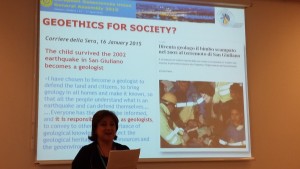This week we’re reporting live from the European Geoscience Union (EGU) General Assembly in Vienna. Yesterday afternoon was the turn of the Geoethics session, which has become something of a regular feature in my EGU diary over the past four years. Organised by the International Association for Promoting Geoethics (IAPG), the session began by looking at ‘Geoethics at the Heart of Geoscience’ and progressed to a series of themed talks on ‘Geoethics and Geohazards’.
Geoethics, as described by the SERC ‘Teaching Geoethics’ website is: ‘encompassing the values and professional standards required of geoscientists to responsibly work in the profession and in service to society. The training of scientists in ethics has traditionally been focused on the Responsible Conduct of Research. However, Geoethics encompasses many more dimensions, including personal and professional behaviors as well as responsibilities to society and to stewardship of Earth.’ Geoethics, therefore, is about ensuring we have the skills, knowledge and understanding to (i) recognise ethical issues within the geosciences, (ii) make well informed, reasoned and transparent decisions which act to the benefit of society.
Geoethics for all
A core message coming through the many excellent presentations yesterday was that geoethics is not a specialist discipline for those interested in philosophy and the academic study of ethics. It is instead a core area of professional development applicable and relevant to all geoscientists. Ruth Allington, Past-President of the European Federation of Geologists, argued very effectively that all geoscientists means all geoscientists. There can sometimes be a barrier placed between academics and practitioners, with geoethical codes suggested to be more relevant to the latter. Ruth reminded us that we are all practitioners, either in the private/public sector, or in academia as practitioners of research or professional educators. It is positive to see that this EGU session has grown in both quality and quantity of presentations over the past few years, and with a growing number of people attending and engaging with session. There is much more to do though to mainstream the subject and bring it to the attention of the broad geoscience profession, but recent initiatives by the Geological Society of London, European Federation of Geologists, National Science Foundation are helping, as is the hard work or organisations such as IAPG and IAGETH.
Demonstrating Geoethics
In talks by both Edmund Nickless (Executive Secretary of the Geological Society of London) and Ruth Allington, the importance of demonstrating geoethics not just talking about it were emphasised. The geoscience teachers (at all levels) that we remember and most influence us are often those who are committed to high quality, considerate, inclusive education. When thinking about diversity, the best bosses are those who model inclusiveness and an organisation where all are welcome – not just talk about it.
For Geology for Global Development, promoting issues relating to ethics, professionalism, diversity, inclusion and sustainability are at the heart of our work. The best way we can communicate the importance of these (both in heart, the right thing to do, and in head, the sensible thing to do) is to model them. Through all aspects of our work we hope to help train young scientists particularly in these aspects of professional development. We will continue to bring them into the blogs we write, the conferences we host and the resources we develop – but ultimately we have to be demonstrating them by the way we operate as an organisation.
From Conceptual to Practical
Mainstreaming geoethics into the normal training and ongoing professional development of geoscientists will require multiple tools, each bringing it from the conceptual or philosophical – to the practical. There is an important role for professional societies and institutions which often facilitate peer-to-peer accountability, for universities to include courses in ethics as part of professional skills modules, and for organisations such as Geology for Global Development to promote practical case studies from the perspective of the global south and development contexts.
Ultimately, it is about being individuals who are pro-active in understanding this important area of professional skills development, taking personal responsibility ensuring ethics is at the heart of our geoscience.
(*There were many other excellent talks and posters within this session, particularly the PhD work by Marie Charriere on real-time evaluation of risk communication).

